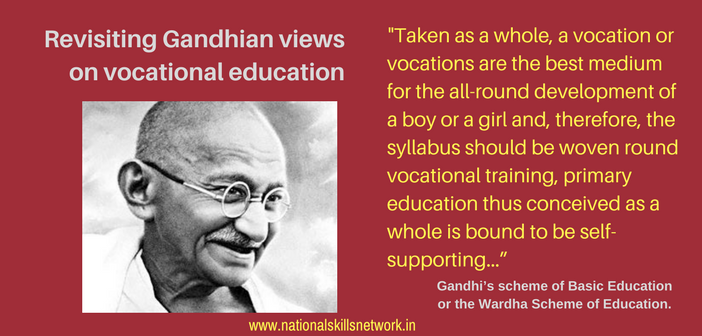Mahatma Gandhi’s views on education have inspired and invigorated several discussions and decisions on educational policy and practice. Kothari Commission Report (1964 -66) was significantly inspired by Gandhian philosophy while recommending reforms in schooling and technical training that have stayed with us till today. However, somewhere down the line, we seem to have lost a balanced approach to promote, pursue and reward vocational aspects of learning by doing, dignity of labour and other values to be inculcated at an early age. These were the main tenets of Gandhiji’s concept of craft-centric education that seems to find an echo in present initiatives at skill development and vocationalisation of school education in India.
Technical and vocational education and training
Today, we are at a critical juncture when it comes to reviving interest in skills and vocational training and making learning outcome-based and industry-relevant. Gandhiji was earliest proponent of technical education and linking curriculum with industry needs. Of course, the needs may be different today, but the essence of making education work-integrated is of prime value.
“I would revolutionize college education and relate it to national necessities. There would be degrees for mechanical and other engineers. They would be attached to the different industries which should pay for the training of the graduates they need”. M.K.Gandhi
 Crafts-centric education for skilling
Crafts-centric education for skilling
Our efforts at rectifying the imbalance in our education system through empowering potential of skilling finds a deep connect with Gandhian principles of craft-centered education. Whatever we are striving for – learning by doing, work integrated learning, respect for manual skills, self-reliance through sustainable livelihoods, – concepts like these are deeply ingrained in Mahatma Gandhi’ s emphasis on manual and productive work as integral to basic education. Let’s look at some of his key thoughts and ideas that have found a way in current endeavours to link education with employment and entrepreneurship through skill development.
Education through crafts
Mahatma Gandhi had emphasized that handicrafts should be taught “not merely for production work but for developing intellect of the pupils.” And, this idea has been implemented in schools as Socially Useful and Productive Work (SUPW) as per reports of landmark commissions and policy. SUPW is mostly perceived as a hobby; it could be embroidery, clay modeling, bamboo crafts, leather work, pottery and many other socioculturally relevant creatively stimulating activities that have a potential for enabling livelihoods. When connected with skilling and vocational options, SUPW can transform the way children perceive manual work and impact their young minds positively towards dignity of work and labour.
Benefits of craft-centered education
Craft-centered education creates a balance between theory and monotonous learning through creative stimulation and self-expression. It helps in reducing discrimination between manual and intellectual skills and overcoming prejudices through respect for socially meaningful work that meets the needs of urban and rural Indians. It makes one feel proud about earning a decent livelihood through sustainable sources of income and community initiatives that result in cooperative societies and micro enterprises.
Being connected with the farm and the factory
Gandhiji’s concept of basic education that included manual work as a means to make education inclusive. He strongly believed in holistic curriculum, even in primary education that introduces children to work-experience through agriculture, weaving, carpentry and several other skills. This would help in balancing the danger of making education over-academic or bookish and influence mindsets positively towards respect for work and dignity of skills and labour.
The Gandhian link with Kothari Commission
The commission began its work on 2nd October 1964 and had followed many Gandhian principles and values on education as an instrument of social change. The recommendations of this commission have resounded in many national policies to follow that placed a premium on the need for industry relevant education for self-sufficiency, economic growth.
(a) Educational opportunity at the secondary (and higher) level is a major instrument of social change and transformation. Facilities for secondary education should accordingly be extended expeditiously to the areas and classes which have been denied these in the past.
(b) There is a need to increase facilities for technical and vocational education at this stage. Provision of facilities for secondary and vocational education should conform broadly to the requirements of the developing economy and real employment opportunities. Such linkage is necessary to make technical and vocational education at the secondary stage effectively terminal. Facilities for technical and vocational education should be suitably diversified to cover a large number of fields, such as agriculture, industry, trade and commerce, medicine and public health, home management, arts and crafts, secretarial training, etc. Reference: Kothari Commision Report
Integrating general and vocational education
The course correction and other efforts at making education balanced and inclusive has resulted in a dedicated Ministry of Skill Development and Entrepreneurship. And, there are key interventions towards bringing MHRD and MSDE closer through equivalence and interoperability of qualifications and renewed interest in bringing much-needed respect for ITIs and similar technical institutions. This will facilitate horizontal movement from vocational to general education and vice-versa and contribute towards change in mindset and eliminate the elitist bias general education.
Today, we are taking drastic measures and putting in huge efforts in reconstructing our education landscape to meet the demands of the industry and economy, at large. There was much clarity half a century ago on what should be our way forward. Somewhere this got blurred as education got equated with academic excellence and theoretical knowledge was not balanced with practical exposure while designing, developing and delivering courses through major curricular reforms.













Entrepreneurial and driven Head of Institution, with 20 years of IT industry expertise in founding a
bunch of professional training institutions. Facilitator and builder of up-to-date technology
management and project development teams, with specialty in both start-up and scaled growth
stages. Proven fundraising and networking skills, building fruitful partnerships with Govt. and
Corporate Companies
Want social project